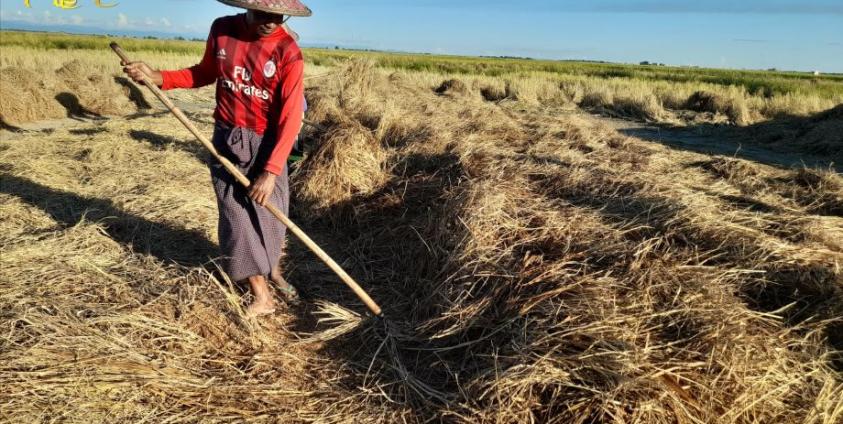Thinzar Nwe — Shortages of fuel and labor are causing major challenges for farmers in Arakan State during this year's paddy harvest.
Farmers have reported challenges in harvesting their ripe rice because of fuel, labor, rice harvesters, and spare parts shortages.
U Maung Thein Hla, a farmer from Tin Htein Kan village in Mrauk-U Township, told Narinjara News, “There has been a shortage of fuel since the beginning of the conflict, which has lasted nearly a year. We are unable to purchase machine spare parts, and there is a lack of workers available. Six workers are needed to harvest one acre of paddy, but there is a lack of available labor. I am not confident about how we will be able to collect the paddy this year.”
Kauk Yin rice has already been harvested in certain townships in Arakan State since early November, and Paw San Hmwe rice is projected to be harvested by the end of this month.
A resident of Bu Ta Lone village in eastern Mrauk-U Township informed Narinjara News that the mature rice crop is being harvested manually with traditional implements.
“In this area, the Thiri Don rice is initially harvested manually. Without any combine harvesters available, families collaborate to work together. Relying on human labor like in the past is a lengthy and exhausting process. It also needs a lot of individuals. It is challenging to thresh the rice and finish the entire paddy production process without the use of machinery. If it rains while they are working in production and there is no shelter, the rice plants will start to sprout,” he explained.
Farmers claim that utilizing machinery for harvesting increases efficiency by saving labor and time, while also removing the requirement to manually complete the entire rice production process.
If you choose to harvest manually, you will require human labor for both harvesting and finishing the whole production process, which can be very time-consuming.
A lot of farmers are saying there is a lack of people who are willing to work, and this has been made worse by the continuing conflict. Consequently, numerous individuals have departed to overseas nations seeking opportunities for making a living.
Farmers in Arakan State are not only facing labor problems but also struggling with decreased rice prices, excess rice supply, low demand, and increasing fuel costs for machinery.
Seven workers are required for harvesting one acre of rice, with more needed for bigger areas.
Certain farmers are opting to utilize machinery for harvesting due to the lack of labor, even though it is expensive and without taking into account the financial consequences.
In the 2023 rice harvesting season, the majority of farmers were forced to manually harvest their crops because there was a shortage of fuel following the commencement of the conflict.
Arakan State cultivates different types of rice, such as Shwe Wah Tun, Sar Pa Si, Thiri Don, Nga Sein, Ae Ma Hta, and Paw San Hmwe.
Local farmers in Arakan State claim that the amount of rice and paddy produced is sufficient for the local market and even exceeds the demand, with plans to export to both domestic and international markets.
Prior to the dispute, rice and paddy were sent from Arakan State to Bangladesh via border trade, enabling farmers to fetch reasonable prices for their produce and support their means of living.
Arakan State used to have 1.2 million acres of rice fields, but currently, only about 60,000 acres are dedicated to rice cultivation.
As per the UNDP report released on November 7, Rakhine is on the brink of severe famine.
Forecasts suggest that by March-April 2025, domestic food production will meet only 20% of the population's requirements. The decrease in domestic rice output is caused by insufficient seeds, fertilizers, extreme weather, and an increase in internally displaced individuals unable to engage in farming activities. In addition to the almost complete stop of commerce, more than 2 million individuals are in danger of experiencing starvation.







